When vampires run amok, who has to stop them?
This is one of the questions I pose in my novella Nightshades, which is about a newly-formed government agency trying to pull together a team to stop a major vampire offensive.
For the last few years, I have been writing the Old World series for 47North, in which an extensive supernatural world is unknown to humans. Writing about the clash between a hidden world and the real world is great fun, but a few years ago, I started thinking about what would happen if everyone found out about a supernatural threat. How would the government respond? The legal system? How would law enforcement officials investigate a crime in which all the suspects are off the grid and have superpowers?
Nightshades is about partners who do just that, in the moments right after the discovery of vampires. Here are five urban fantasy series where partners in an actual government agency have to deal with otherworldly threats.
The Nathaniel Cade Series by Chris Farnsworth
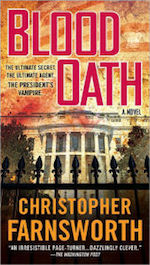 A powerful vampire swears a blood oath to the office of the President, and has to work with a very young and very green White House employee to fight supernatural threats. I read Blood Oath, the first book in Christopher Farnsworth’s President’s Vampire trilogy, in between the idea for Nightshades and actually writing it, and thank goodness. Blood Oath and its sequels (please more books, Chris?) are the gold standard for how to do third person, procedural UF with plenty of action and intrigue.
A powerful vampire swears a blood oath to the office of the President, and has to work with a very young and very green White House employee to fight supernatural threats. I read Blood Oath, the first book in Christopher Farnsworth’s President’s Vampire trilogy, in between the idea for Nightshades and actually writing it, and thank goodness. Blood Oath and its sequels (please more books, Chris?) are the gold standard for how to do third person, procedural UF with plenty of action and intrigue.
The Peter Grant/Rivers of London Series by Ben Aaronovitch
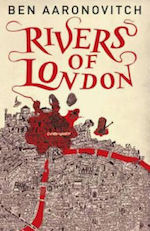 To be honest, I had a tough time choosing between this one and Paul Cornell’s Shadow Police books, but since I’m mentioning Cornell in another post, it only seems fair to put the focus here. In the Rivers of London books, a young London police officer discovers that not only does he have access to magic, but there’s a (tiny) division of the Met devoted to handling supernatural crime. The setup may not sound groundbreaking, but Aaronovitch has a lot of touches here that make the series feel innovative, both in his mythology and in Peter’s characterization. There’s also a great, slightly crotchety mentor that I think of as Daniel Craig and a whole subplot with Peter’s best friend losing her face and … well, just read it.
To be honest, I had a tough time choosing between this one and Paul Cornell’s Shadow Police books, but since I’m mentioning Cornell in another post, it only seems fair to put the focus here. In the Rivers of London books, a young London police officer discovers that not only does he have access to magic, but there’s a (tiny) division of the Met devoted to handling supernatural crime. The setup may not sound groundbreaking, but Aaronovitch has a lot of touches here that make the series feel innovative, both in his mythology and in Peter’s characterization. There’s also a great, slightly crotchety mentor that I think of as Daniel Craig and a whole subplot with Peter’s best friend losing her face and … well, just read it.
The Jaz Parks Novels by Jennifer Rardin
 I recently wrote a blog post praising Rardin, who was one of the bigger names in urban fantasy as it was exploding during the mid-‘00s. Her series is about two CIA assassins, a butt-kicking, mouthy female narrator and her centuries-old vampire partner. There’s some great worldbuilding here, and the espionage/CIA angle provides a fresh twist to a popular format.
I recently wrote a blog post praising Rardin, who was one of the bigger names in urban fantasy as it was exploding during the mid-‘00s. Her series is about two CIA assassins, a butt-kicking, mouthy female narrator and her centuries-old vampire partner. There’s some great worldbuilding here, and the espionage/CIA angle provides a fresh twist to a popular format.
The Mindspace Investigations Series by Alex Hughes
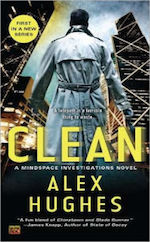 I wasn’t immediately taken with Hughes’ series about a telepath who works with the police to solve murders, mostly because the main character is a recovering drug addict who always feels like he’s hanging onto sobriety by a thread. But I kept going, and the series has really grown on me. What I like about the Mindspace books is that they’re set in a future Atlanta that feels extremely rich and established. It’s like a more cheerful Blade Runner or a less cartoonish Fifth Element, with flying cars, a whole history of tech wars, and a mysterious telepath organization called the Guild, which is like a scary telepathic U.N. The mythology has all these subtle layers that present themselves in sequels, and by the end you’re wondering how any police department works without a telepath consultant.
I wasn’t immediately taken with Hughes’ series about a telepath who works with the police to solve murders, mostly because the main character is a recovering drug addict who always feels like he’s hanging onto sobriety by a thread. But I kept going, and the series has really grown on me. What I like about the Mindspace books is that they’re set in a future Atlanta that feels extremely rich and established. It’s like a more cheerful Blade Runner or a less cartoonish Fifth Element, with flying cars, a whole history of tech wars, and a mysterious telepath organization called the Guild, which is like a scary telepathic U.N. The mythology has all these subtle layers that present themselves in sequels, and by the end you’re wondering how any police department works without a telepath consultant.
The Dresden Files by Jim Butcher
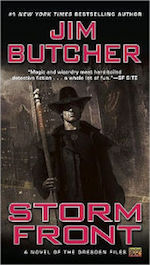 Jim Butcher’s seminal urban fantasy series does always fit my criteria—the majority of the novels focus entirely on the titular PI/wizard—but frankly, this list just felt wrong without it. In a number of the Dresden books, Harry is enlisted to help Chicago Police detective Karrin Murphy with her Special Investigations cases. Later in the series S.I. takes a backseat, but is always sort of present within the mythology. As with all things Dresden, the S.I. cops feels so real that you’re sure they’re working on cases even in between novels where they don’t appear.
Jim Butcher’s seminal urban fantasy series does always fit my criteria—the majority of the novels focus entirely on the titular PI/wizard—but frankly, this list just felt wrong without it. In a number of the Dresden books, Harry is enlisted to help Chicago Police detective Karrin Murphy with her Special Investigations cases. Later in the series S.I. takes a backseat, but is always sort of present within the mythology. As with all things Dresden, the S.I. cops feels so real that you’re sure they’re working on cases even in between novels where they don’t appear.
Top image from Grimm
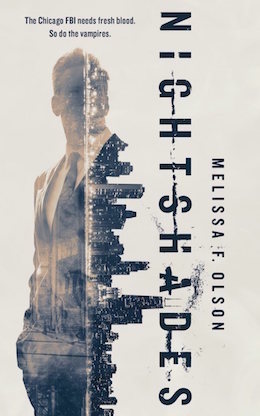 Melissa Olson is the author of six Old World novels for 47North as well as the upcoming Tor.com novella Nightshades. She lives in Madison, WI with her husband, two kids, three dogs, and a jittery chinchilla.
Melissa Olson is the author of six Old World novels for 47North as well as the upcoming Tor.com novella Nightshades. She lives in Madison, WI with her husband, two kids, three dogs, and a jittery chinchilla.










First ones I thought of were the SI unit in the Dresden Files and the Monster Control Bureau in the Monster Hunter International books. In the Dresden universe the idea is that ordinary people don’t really want to know the truth, and in MHI it’s that ordinary people shouldn’t know the truth.
There’s also Paul Cornell’s Shadow Police series.
Also frequent Tor.com writer Keith DeCandido’s Precinct series. It’s kind of like Law & Order meets Lord of the Rings. Just your average police procedural, but with magic and elves and stuff. :D
As far as I’m concerned, the City Watch/ Sam Vimes arc of Discworld will always be my definitive “policing the supernatural” narrative.
Aaronovitch has become one of my favorites – the Rivers series isn’t particularly “great”, per se, but something about it keeps me coming back and re-reading them; each time I get something new from them as well.
Vimes, alternately, is one of the best takes on Robert Peel and its been a pleasure watching him grow in to that great characterization of a great man.
In both cases the officers are both well-intentioned and all too relatably human, far more so than in many “human-only” books.
You could also try Nick Pollatta’s Bureau 13 books. Ultra covert FBI branch to handle the supernatural.
My vote goes towards Sam Vimes as well. Those books handle the practical problems so… Tidily given how messy the narratives show it can be. Particularly Feet of Clay.
I also always liked the background to the Anita Blake mysteries. It always seemed a series of wasted opportunities.
The first couple of books have the local police Supernatural Unit as characters. As the series goes on, they seem to dropped.
Then there’s all the potential about the protagonist getting conscripted into Ferderal Law Enforcement. There’s interesting drama inherent in state-licensed Vampire Hunters (basically supernatural bounty hunters) suddenly being Grandfathered into the US Marshal’s service, and being given the rights and responsibilities of a Federal Law Enforcement Officer. No training is given, they are just given a badge and told to deal with supernatural crime. It’s touched upon that most of them have only ever dealt with vampires. Now they have to deal with everything (By this point Blake had dealt with evil magic, various were-creatures and the far, as well as a vampire so old the writing inferred he could have been a Nethaneral human), including the public!
Also I suspect they’d lose income as well, as they’d get a stipend from the Federal Government instead of the bounty for every court-mandated vampire execution…
But all of that is ignored for knock-off Ann Rice / White Wolf Vampire clans shenanigans combined with excessive sex scenes with a variety of supernatural bed partners. <yawn>
The Kitty Norville books have a background thread about how the police adapt to suddenly having to take supernatural crime seriously, but it’s better handled. Still, I wouldn’t mind having more detail in the foreground.
Charles Stross’ “Laundry Books” are great in this genre, orientated around a British spy org focused on dealing with supernatural threats